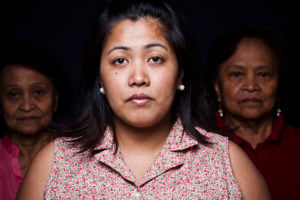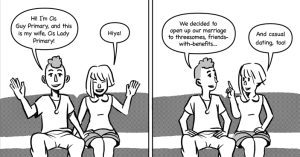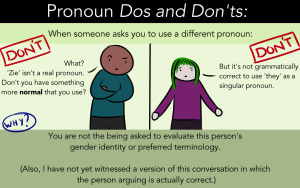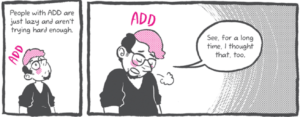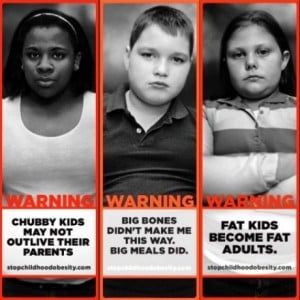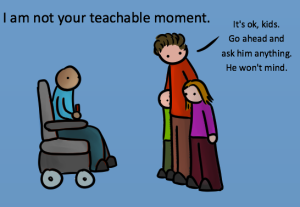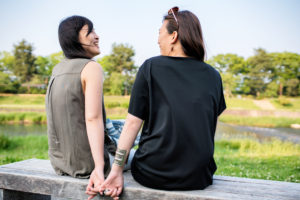
A couple sits on a park bench overlooking nature. They smile at each other as they hold hands.
“I think you’re really just infatuated.”
“Are you sure you’re not just experimenting?”
“It could be hormones. Did you sleep with him?”
Many people, especially women and LGBTQIA+ people, have heard these phrases when they’ve said they’re in love.
And it’s understandable that people might question this claim. Sometimes, we do mistake love and lust. That creepy dude who repeatedly asked you out in college, guilted you for saying no, and claimed it was all because he loved you probably wasn’t really acting out of love. He was acting out of misogynistic entitlement.
But when we tell people they’re not really in love, we teach them not to trust their own emotions, and we invalidate their experiences – especially when those experiences don’t match a narrow definition of what love is.
Here are some reasons people are frequently told they’re not in love – and why we need to question that reasoning.
1. Because They Just Met
It’s often said that love at first sight isn’t real – only lust is. And it’s true that you cannot know at first sight whether someone is compatible with you or would respect you.
But that doesn’t mean you can’t feel love for someone you just met.
Sometimes, we really do develop deep affection and caring for people – friends as well as romantic partners – in a short period of time.
After all, parents often love their children from the moment they’re born, and we don’t question whether they’ve really gotten to know each other.
When we tell people who just met that they’re not actually in love, we teach them to doubt their own perceptions – which is similar to the manipulation tactic of gaslighting.
Whether or not two people will last in the long term is a different story. But it’s not our place to question how they feel about each other.
2. Because They’re Young
Part of the kyriarchy – the system that puts certain groups in our society above others – is the valuing of adults above children. Adults, we’re taught, have serious, profound emotions. Kids have trivial, cute ones.
But our age and the depth of our emotions are not actually related. Children and teenagers can feel all sorts of feelings for all sorts of people.
Just as love at first sight doesn’t indicate compatibility, young love doesn’t indicate readiness to, say, have sex or get married. But that doesn’t make it less powerful or beautiful.
When we tell kids that they’re not really in love, we contribute to the larger devaluing of young people’s emotions. And since we’ve all been young ourselves at some point, I think we can all recall a time during childhood when we’ve felt deeply and intensely – and perhaps a time when we’ve yearned to have those emotions acknowledged by adults.
3. Because They’re Not in a Straight Relationship
LGBTQIA+ people are often told that they’re just experimenting or rebelling when they’re in love. Straight people, on the other hand, are rarely asked whether they’re really in love or are just “going through a phase.”
This is because we don’t trust the identities of people who aren’t straight. Queer women especially are often accused of dating or hooking up with women just for the attention.
Of course, in reality, someone is no more likely to be “experimenting” with the same gender or someone who is genderqueer than they are with the opposite gender. If anything, people would be less likely to date someone just for the fun of it when that’s not the type of person society expects them to date.
Telling people they’re not in love because they’re not straight not only is super invalidating but also encourages the view that straight relationships are the only ones that exist.
4. Because They’re Women – Especially Women Who Have Had Sex
Once, in college, I saw a mental health counselor at my school’s psychological services because someone I’d started dating had broken things off and I was depressed about it. Immediately, she asked if I had slept with him. (I didn’t.)
Years later, when I was telling a new friend about a breakup that was very difficult to get over, he responded, “Did he take your virginity?” (He was the first person I had intercourse with, but that’s not why I loved him, and reducing love to a sexual act is incredibly trivializing.)
Women are often warned that they’ll start to think they’re in love if they’ve had sex. Then, when they are in love, people question whether it’s just because of hormones.
I’m not saying sex can’t make you feel more attached to someone. It can. But that doesn’t make the bond less real than one formed by, say, having a heart-to-heart. Less stable, maybe, but not less real.
Furthermore, we should be skeptical of the way we disproportionately say this to women. We question the feelings of women who have had sex because we believe women can’t have sex as casually as men and think of women as “belonging” to people they’ve had sex with, especially for the first time. So, basically, we think all of this because of sexism.
Beyond the issue of women’s sexual behavior, we tend to view women’s emotions – like young people’s – as less profound. When men say they’re in love, they supposedly mean something deep and philosophical and spiritual, while women are just being hopeless romantics obsessed with Nicholas Sparks novels.
You can find evidence of this belief dating as far back as Shakespeare. As Duke Orsino put it in Twelfth Night,
There is no woman’s sides
Can bide the beating of so strong a passion
As love doth give my heart. No woman’s heart
So big, to hold so much. They lack retention.
Alas, their love may be called appetite,
No motion of the liver, but the palate.
In other words, a woman’s love is sort of like a chocolate craving.
Assuming that women who say they’re in love are just being petty and foolish stems from and contributes to a view of women as petty and foolish and leads people to not take women seriously.
5. Because We’re Equating Love With A Patriarchal, Narrow Idea of Love
Some people say that you only have one “true love,” and that’s the person you end up marrying and having and grandchildren with. But that leaves out a shit ton of people.
What about, say, a pansexual, polyamorous person who wants to have many partners and raise their children together?
What about an asexual person whose version of love doesn’t include sex?
What about someone who once fit the mainstream idea of what love looks like but lost her husband in a tragic accident?
When we tell people they’re not in love, what we often really mean is that we don’t see the relationship as this supposed “true love” we hear about in Disney movies. It’s framed as a warning: “You’ll get your heart broken.”
But love that doesn’t last forever is still worthwhile. And relationships don’t have to end in heartbreak. Some fizzle out, some become less intense but get rekindled from time to time, and some just take a different form.
We need to stop valuing relationships based on a patriarchal ideal that paints certain ones as more important than others.
***
Why do I care about this? I’ve been told many times myself that I wasn’t actually in love because I was young, was perceived as a woman, and didn’t know the person I loved for long.
And you know what? I’ll admit that the first time people said this, they were right. I was 13 and “in love” with my camp counselor, which basically meant I had a giant crush on him from afar and indulged in the fantasy that I would marry him one day because I was a depressed teenager who wanted a fantasy to indulge in.
But I’m the only one who can really know that. Other people didn’t have the right to tell me it.
Because the other times people said this to me, they were wrong. When my first boyfriend and I said “I love you” after three weeks in college, we meant it, and we continued saying it for years, even after we broke up.
After that, my friend made fun of me for saying I loved my next boyfriend about two months in. But we dated for two years, and I still have a lot of love for him as well.
Nevertheless, other people’s questioning really did get into my head. Just the other day, I realized I was doing it to myself. After exchanging “I love you”s with someone after less than a month, I found myself doubting if I should be investing much in the relationship.
“But do you really love each other, or are you just infatuated? Is it because you had sex?” I caught myself thinking.
Then I thought: Well, we want to do sweet things for each other all the time, and we’re superlatively happy around each other.
Why is that something we’ve been taught to run away from? We should be celebrating when we find something special, not discounting it and pushing it away.
Western society devalues emotions, including love, as a sign of weakness or irrationality. But there is nothing weak or irrational about caring deeply for many people and developing those feelings easily. I happen to think that’s a wonderful thing.
So, next time someone tells you they’re in love, don’t try to tell them how they’re actually feeling. Don’t warn them that their relationship may not look the way you think relationships should look. Be happy for them – because love is a gift, and it’s something that many of us could use more of in our lives.
[do_widget id=’text-101′]
Suzannah Weiss is a Contributing Writer for Everyday Feminism and a New York-based writer whose work has appeared in The Washington Post, Salon, Seventeen, Buzzfeed, The Huffington Post, Bustle, and more. She holds degrees in Gender and Sexuality Studies, Modern Culture and Media, and Cognitive Neuroscience from Brown University. You can follow her on Twitter @suzannahweiss.
Search our 3000+ articles!
Read our articles about:
Our online racial justice training
Used by hundreds of universities, non-profits, and businesses.
Click to learn more





